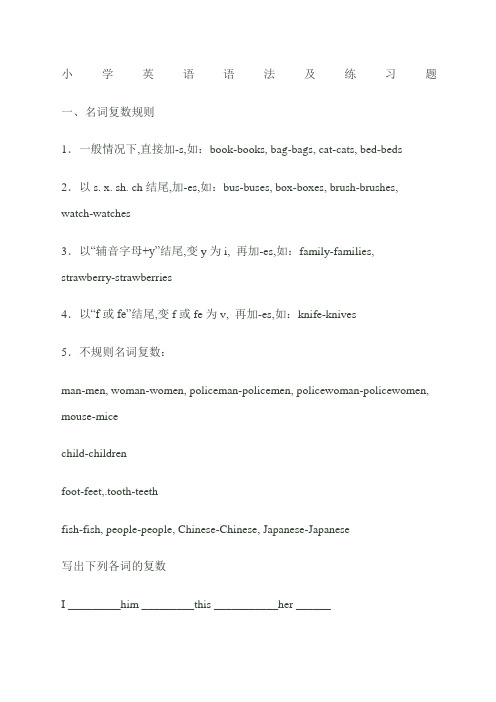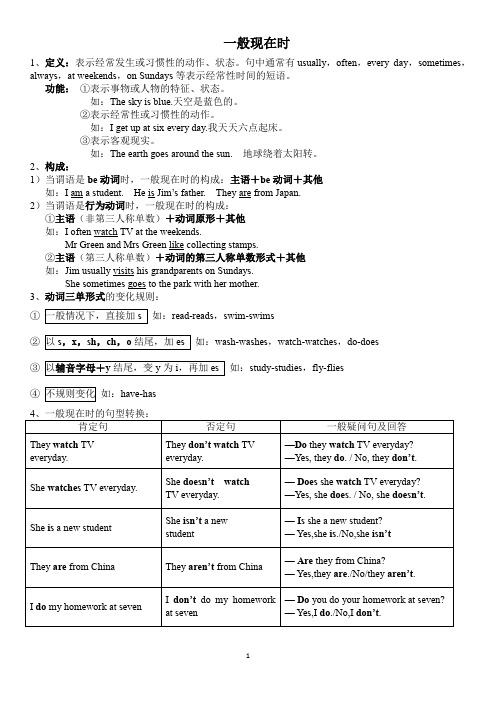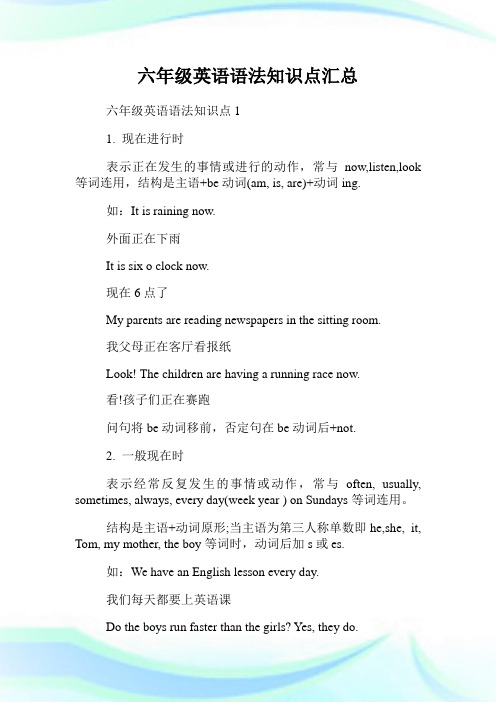小学六年级英语语法要点及习题.docx
小学英语六年级总复习语法及练习题一

小学英语语法及练习题一、名词复数规则1.一般情况下,直接加-s,如:book-books, bag-bags, cat-cats, bed-beds 2.以s. x. sh. ch结尾,加-es,如:bus-buses, box-boxes, brush-brushes, watch-watches3.以“辅音字母+y”结尾,变y为i, 再加-es,如:family-families, strawberry-strawberries4.以“f或fe”结尾,变f或fe为v, 再加-es,如:knife-knives5.不规则名词复数:man-men, woman-women, policeman-policemen, policewoman-policewomen, mouse-micechild-childrenfoot-feet,.tooth-teethfish-fish, people-people, Chinese-Chinese, Japanese-Japanese写出下列各词的复数I _________him _________this ___________her ______watch _______child _______photo ________diary ______day________ foot________ book_______ dress ________tooth_______ sheep ______box_______ strawberry _____thief _______yo-yo ______ peach______ sandwich ______man______ woman_______ paper_______ juice___________water________ milk________ rice__________ tea__________二、一般现在时一般现在时基本用法介绍No. 1一般现在时的功能1.表示事物或人物的特征、状态;如:The sky is blue.天空是蓝色的;2.表示经常性或习惯性的动作;如:I get up at six every day.我每天六点起床;3.表示客观现实;如:The earth goes around the sun.地球绕着太阳转;一般现在时的构成1. be动词:主语+beam,is,are+其它;如:I am a boy.我是一个男孩;2.行为动词:主语+行为动词+其它;如:We study English.我们学习英语;当主语为第三人称单数he, she,it时,要在动词后加"-s"或"-es";如:Mary likes Chinese.玛丽喜欢汉语;一般现在时的变化1. be动词的变化;否定句:主语+ be + not +其它;如:He is not a worker.他不是工人;一般疑问句:Be +主语+其它;如:-Are you a student-Yes. I am. / No, I'm not.特殊疑问句:疑问词+一般疑问句;如:Where is my bike2.行为动词的变化;否定句:主语+ don't doesn't +动词原形+其它;如:I don't like bread.当主语为第三人称单数时,要用doesn't构成否定句;如:He doesn't often play.一般疑问句:Do Does +主语+动词原形+其它;如:- Do you often play football- Yes, I do. / No, I don't.当主语为第三人称单数时,要用does构成一般疑问句;如:- Does she go to work by bike- Yes, she does. / No, she doesn't.特殊疑问句:疑问词+一般疑问句;如:How does your father go to work 动词+s的变化规则1.一般情况下,直接加-s,如:cook-cooks, milk-milks2.以s. x. sh. ch. o结尾,加-es,如:guess-guesses, wash-washes,watch-watches, go-goes3.以“辅音字母+y”结尾,变y为i, 再加-es,如:study-studies一般现在时用法专练:一、写出下列动词的第三人称单数drink ________ go _______ stay ________ make ________look _________ have_______ pass_______ carry ____ come________ watch______ plant_______ fly ________ study_______ brush________ do_________ teach_______二、用括号内动词的适当形式填空;1. He often ________have dinner at home.2. Daniel and Tommy _______be in Class One.3. We _______not watch TV on Monday.4. Nick _______not go to the zoo on Sunday.5. ______ they ________like the World Cup6. What _______they often _______do on Saturdays7. _______ your parents _______read newspapers every day8. The girl _______teach us English on Sundays.9. She and I ________take a walk together every evening.10. There ________be some water in the bottle.11. Mike _______like cooking.12. They _______have the same hobby.13. My aunt _______look after her baby carefully.14. You always _______do your homework well.15. I _______be ill. I’m staying in bed.16. She _______go to school from Monday to Friday.17. Liu Tao _______do not like PE.18. The child often _______watch TV in the evening.19. Su Hai and Su Yang _______have eight lessons this term.20. -What day _______be it today-It’s Saturday.三、按照要求改写句子1. Daniel watches TV every evening.改为否定句___________________________________________________2. I do my homework every day.改为一般疑问句,作否定回答________________________________________________________ 3. She likes milk.改为一般疑问句,作肯定回答___________________________4. Amy likes playing computer games.改为一般疑问句,作否定回答___________________________________________________5. We go to school every morning.改为否定句_______________________________________________________ 6. He speaks English very well.改为否定句___________________________________________________7. I like taking photos in the park.对划线部分提问________________________________________________________ 8. John comes from Canada.对划线部分提问___________________________________________________9. She is always a good student.改为一般疑问句,作否定回答________________________________________________________ 10. Simon and Daniel like going skating.改为否定句___________________________________________________五、改错划出错误的地方,将正确的写在横线上1. Is your brother speak English __________________2. Does he likes going fishing __________________3. He likes play games after class. __________________4. Mr. Wu teachs us English. __________________5. She don’t do her homework on Sundays. _________________三、现在进行时1.现在进行时表示现在正在进行或发生的动作,也可表示当前一段时间内的活动或现阶段正在进行的动作;2.现在进行时的肯定句基本结构为be+动词ing.3.现在进行时的否定句在be后加not;4.现在进行时的一般疑问句把be动词调到句首;5.现在进行时的特殊疑问的基本结构为:疑问词不达意+ be + 主语+ 动词ing但疑问词当主语时其结构为:疑问词不达意+ be + 动词ing动词加ing的变化规则1.一般情况下,直接加ing,如:cook-cooking2.以不发音的e结尾,去e加ing,如:make-making, taste-tasting3.如果末尾是一个元音字母和一个辅音字母,双写末尾的辅音字母,再加ing,如:run-running, stop-stopping现在进行时专项练习:一、写出下列动词的现在分词:play________ run__________ swim _________make__________go_________ like________ write________ _ski___________read________ have_________ sing ________ dance_________put_________ see________ buy _________ love____________live_______ take_________ come ________ get_________stop_________ sit ________ begin________ shop___________二、用所给的动词的正确形式填空:1.The boy __________________ drawa picture now.2. Listen .Some girls _______________ singin the classroom .3. My mother _________________ cook some nice food now.4. What _____ you ______ do now5. Look . They _______________ have an English lesson .6.They ____________not ,water the flowers now.7.Look the girls ________________dance in the classroom .8.What is our granddaughter doing She _________listen to music.9. It’s 5 o’clock now. We _____________havesupper now10.______Helen____________wash clothes Yes ,she is .三、句型转换:1. They are doing housework .分别改成一般疑问句和否定句__________________________________________________________________________________________________________________________ 2.The students are cleaning the classroom . 改一般疑问句并作肯定和否定回答________________________________________________________________ _________________________________________________________________ _3.I’m playing the football in the playground .对划线部分进行提问________________________________________________________________ _4.Tom is reading books in his study . 对划线部分进行提问四、将来时理论及练习一、概念:表示将要发生的动作或存在的状态及打算、计划或准备做某事;句中一般有以下时间状语:tomorrow, next dayweek, month, year…,soon, the day after tomorrow后天等;二、基本结构:①be going to + do;②will+ do.三、否定句:在be动词am, is, arel后加not或情态动词will后加not成won’t;例如:I’m going to have a picnic this afternoon.→ I’m not going to have a picnic this afternoon.四、一般疑问句:be或will提到句首,some改为any, and改为or,第一二人称互换;例如:We are going to go on an outing this weekend. → Are you going to go on an outing this weekend五、对划线部分提问;一般情况,一般将来时的对划线部分有三种情况;1. 问人;Who 例如:I’m going to New York soon. →Who’s going to New York soon.2. 问干什么;What … do.例如:My father is going to watch a race with me thisafternoon. →What is your father going to do with you this afternoon.3. 问什么时候;When.例如:She’s going to go to bed at nine. →When is she goingto bed六、同义句:be going to = willI am going to go swimming tomorrow明天. = I will go swimming tomorrow. 练习:填空;1. 我打算明天和朋友去野炊;I_____ _______ _________ have a picnic with my friends.I ________ have a picnic with my friends.2. 下个星期一你打算去干嘛我想去打篮球;What ________ ________ _________ _________ _________ next Monday I _______ ______ _____ play basketball.What _________ you do next Monday I ________ play basketball.3. 你妈妈这个周末去购物吗是,她要去买一些水果;_____ your mother _______ ________ go shopping this ___________Yes, she _________. She ______ ________ __________ buy some fruit.4. 你们打算什么时候见面;What time _______ you _________ __________ meet改句子;5. Nancy is going to go camping.改否定Nancy ________ going to go camping.6. I’ll go and join them.改否定I _______ go ______ join them.7. I’m going to get up at 6:30 tomorrow.改一般疑问句________ _______ ________ to get up at 6:30 tomorrow8. We will meet at the bus stop at 10:30.改一般疑问句_______ ________ meet at the bus stop at 10:30.9. She is going to listen to music after school.对划线部分提问________ _______ she ________ ________ _________ after school10. My father and mother are going to see a play the day after tomorrow.同上_________ _________ going to see a play the day after tomorrow.用所给词的适当形式填空;11. Today is a sunny day. We ___________________ have a picnic this afternoon.12. My brother _______________ go to Shanghai next week.13. Tom often ______________go to school on foot. But today is rain. He ______________ go to school by bike.14. What do you usually do at weekends I usually __________ watch TV and ____________catch insects15. It’s Friday today. What _____she _________ do this weekend She ______________ watch TV and _____________ catch insects.16. What ___________ d0 you do last Sunday I ____________ pick apples on a farm. What ______________ do next Sunday I ______________ milk cows.17. Mary ____________ visit her grandparents tomorrow.18. Liu Tao ____________ fly kites in the playground yesterday.19. David ______________ give a puppet show next Monday.20. I ________________ plan for my study now五、一般过去时1.一般过去时表示过去某个时间发生的动作或存在的状态,常和表示过去的时间状语连用;一般过去时也表示过去经常或反复发生的动作感谢; 2.Be动词在一般过去时中的变化:⑴am 和is在一般过去时中变为was;was not=wasn’t⑵are在一般过去时中变为were;were not=weren’t⑶带有was或were的句子,其否定、疑问的变化和is, am, are一样,即否定句在was或were后加not,一般疑问句把was或were调到句首;3.句中没有be动词的一般过去时的句子否定句:didn’t +动词原形,如:Jim didn’t go home yesterday.一般疑问句:在句首加did,句子中的动词过去式变回原形;如:Did Jim go home yesterday特殊疑问句:⑴疑问词+did+主语+动词原形如:What did Jim do yesterday⑵疑问词当主语时:疑问词+动词过去式如:Who went to home yesterday动词过去式变化规则:1.一般在动词末尾加-ed,如:pull-pulled, cook-cooked2.结尾是e加d,如:taste-tasted3.末尾只有一个元音字母和一个辅音字母的重读闭音节,应双写末尾的辅音字母,再加-ed,如:stop-stopped4.以“辅音字母+y”结尾的,变y为i, 再加-ed,如:study-studied5.不规则动词过去式:am,is-was, are-were, do-did, see-saw, say-said, give-gave, get-got, go-went, come-came, have-had, eat-ate, take-took, run-ran, sing-sang, put-put,make-made, read-read, write-wrote, draw-drew, drink-drank, fly-flew, ride-rode, speak-spoke, sweep-swept, swim-swam, sit-sat过去时练习写出下列动词的过去式isam_________ fly_______ plant________ are ________drink_________ play_______ go________ make ________does_________ dance________ worry________ ask _____taste_________ eat__________ draw________ put ______throw________ kick_________ pass_______ do ________Be动词的过去时练习1Name ____________ No. ______ Date __________一、用be动词的适当形式填空1. I _______ at school just now.2. He ________ at the camp last week.3. We ________ students two years ago.4. They ________ on the farm a moment ago.5. Yang Ling ________ eleven years old last year.6. There ________ an apple on the plate yesterday.7. There ________ some milk in the fridge on Sunday.8. The mobile phone _______ on the sofa yesterday evening.二、句型转换1. It was exciting.否定句:________________________________________________ 一般疑问句:____________________________________________ 肯、否定回答:__________________________________________ 2. All the students were very excited.否定句:________________________________________________一般疑问句:____________________________________________ 肯、否定回答:__________________________________________ 3. They were in his pocket.否定句:________________________________________________ 一般疑问句:____________________________________________ 肯、否定回答:__________________________________________ Be动词的过去时练习2Name ____________ No. ______ Date __________一、用be动词的适当形式填空1. I ______ an English teacher now.2. She _______ happy yesterday.3. They _______ glad to see each other last month.4. Helen and Nancy ________ good friends.5. The little dog _____ two years old this year.6. Look, there ________ lots of grapes here.7. There ________ a sign on the chair on Monday..8. Today _____ the second of June. Yesterday ______ the first of June. It _____ Children’s Day. All the students ______ very excited.二、句型转换1. There was a car in front of the house just now.否定句:________________________________________________一般疑问句:____________________________________________肯、否定回答:__________________________________________肯、否定回答:__________________________________________三、中译英1.我的故事书刚才还在手表旁边;___________________________________________________________ 2.他们的外套上个礼拜放在卧室里了;___________________________________________________________ 3.一会以前花园里有两只小鸟;行为动词的过去时练习1Name ____________ No. ______ Date __________一、用行为动词的适当形式填空1. He _________ live in Wuxi two years ago.2. The cat ________ eat a bird last night.3. We _______ have a party last Halloween.4. Nancy ________ pick up oranges on the farm last week.5. I ________ make a model ship with Mike yesterday.6. They ________ play chess in the classroom last PE lesson.7. My mother _______ cook a nice food last Spring Festival.8. The girls ________ sing and _______ dance at the party.二、句型转换1. Su Hai took some photos at the Sports day.否定句:________________________________________________ 一般疑问句:____________________________________________ 肯、否定回答:__________________________________________2. Nancy went to school early.否定句:________________________________________________ 一般疑问句:____________________________________________ 肯、否定回答:__________________________________________ 3. We sang some English songs.否定句:________________________________________________ 一般疑问句:____________________________________________ 肯、否定回答:__________________________________________ 行为动词的过去时练习2Name ____________ No. ______ Date __________一、用be动词的适当形式填空1. I ______ watch a cartoon on Saturday.2. Her father _______ read a newspaper last night.3. We _________ to zoo yesterday, we _____ to the park. go4. ______ you _______ visit your relatives last Spring Festival5. ______ he _______ fly a kite on Sunday Yes, he ______.6. Gao Shan _______ pull up carrots last National Day holiday.7. I ____________ sweep the floor yesterday, but my mother ______.8. What ______ she _______ find in the garden last morning She __________ find a beautiful butterfly.二、句型转换1. They played football in the playground.否定句:________________________________________________一般疑问句:____________________________________________肯、否定回答:__________________________________________三、中译英1. 格林先生去年住在中国;________________________________________________________2. 昨天我们参观了农场;________________________________________________________3. 他刚才在找他的手机;________________________________________________________ 过去时综合练习1Name ____________ No. ______ Date __________一、用动词的适当形式填空1. It ______ be Ben’s birthday last Friday.2. We all ______ have a good time last night.3. He ________ jump high on last Sports Day.4. Helen ________ milk a cow on Friday.5. She likes ______ newspapers, but she ______ a book yesterday. read6. He _______ football now, but they _______ basketball just now. play7. Jim’s mother _________ plant trees just now.8. _______ they ________ sweep the floor on Sunday No, they _____.9. I _______ watch a cartoon on Monday.10. We ___________ go to school on Sunday.。
六年级英语语法大全及练习

一般现在时1、定义:表示经常发生或习惯性的动作、状态。
句中通常有usually,often,every day,sometimes,always,at weekends,on Sundays等表示经常性时间的短语。
功能:①表示事物或人物的特征、状态。
如:The sky is blue.天空是蓝色的。
②表示经常性或习惯性的动作。
如:I get up at six every day.我天天六点起床。
③表示客观现实。
如:The earth goes around the sun. 地球绕着太阳转。
2、构成:1)当谓语是be动词时,一般现在时的构成:主语+be动词+其他如:I am a student. He is Jim’s father. They are from Japan.2)当谓语是行为动词时,一般现在时的构成:①主语(非第三人称单数)+动词原形+其他如:I often watch TV at the weekends.Mr Green and Mrs Green like collecting stamps.②主语(第三人称单数)+动词的第三人称单数形式+其他如:Jim usually visits his grandparents on Sundays.She sometimes goes to the park with her mother.3、动词三单形式的变化规则:①如:read-reads,swim-swims②如:wash-washes,watch-watches,do-does③如:study-studies,fly-flies④如:have-has一. 动词第三人称变化填空drink ________ go _________ stay ________ make ________ look_________Have _________ pass_________ carry _________ come__________ watch__________Plant _______ fly_______ study_______ brush________ teach_______ wash_________match_______drink ________ finish________go________ snow______ carry________二. 用括号内动词的适当形式填空。
小学六年级英语语法详解与练习(全)-免费下载

外研社小学六年级上下册英语语法动词时态一般现在时态:用法:1. 表示事物或人物的特征、状态。
如:The sky is blue. 天空是蓝色的。
2. 表示经常性或习惯性的动作。
如:I get up at six every day. 我每天六点起床。
3. 表示客观现实。
如:The earth goes around the sun. 地球绕着太阳转。
构成:1. be 动词:主语+be(am,is,are)+ 其它。
如:I am a boy.我是一个男孩。
2. 行为动词:主语+行为动词(+其它)。
如:We study En glish. 我们学习英语。
当主语为第三人称单数(he, she,it)时,要在动词后加"-s"或"-es"。
如: Mary likes Chi nese. 玛丽喜欢汉语。
否定句、一般疑问句、特殊疑问句:1. be动词的变化。
否定句:主语+ be + not + 其它。
女口:He is not a worker. 他不是工人。
一般疑问句:Be +主语+其它。
如: -Are you a student?-Yes. I am. / No, I'm n ot.特殊疑问句:疑问词+—般疑问句。
如:Where is my bike?2. 行为动词的变化。
否定句:主语+ don 't( does n't ) + 动词原形(+其它)。
如:I don't like bread.当主语为第三人称单数时,要用does n't构成否定句。
如:He does n't ofte n play.一般疑问句:Do( Does ) +主语+动词原形+其它。
如:-Do you ofte n play football?-Yes, I do. / No, I don't.当主语为第三人称单数时,要用does构成一般疑问句。
六年级英语语法知识点汇总.doc

六年级英语语法知识点汇总六年级英语语法知识点11. 现在进行时表示正在发生的事情或进行的动作,常与now,listen,look 等词连用,结构是主语+be动词(am, is, are)+动词ing.如:It is raining now.外面正在下雨It is six o clock now.现在6点了My parents are reading newspapers in the sitting room.我父母正在客厅看报纸Look! The children are having a running race now.看!孩子们正在赛跑问句将be动词移前,否定句在be动词后+not.2. 一般现在时表示经常反复发生的事情或动作,常与often, usually, sometimes, always, every day(week year ) on Sundays等词连用。
结构是主语+动词原形;当主语为第三人称单数即he,she, it, Tom, my mother, the boy等词时,动词后加s或es.如:We have an English lesson every day.我们每天都要上英语课Do the boys run faster than the girls? Yes, they do.男孩比女孩跑的快吗?是的问句借助于do, does否定句借助于don t, doesn t,后面动词一定要还原。
3. 一般过去时表示发生在过去的事情或存在的状态,常与just now; a moment ago; ago; yesterday; last ( week; month; year; Monday; weekend); this morning等词连用。
结构是主语+be动词的过去式(was; were)或主语+动词的过去式。
注意:be动词与动词过去式不可同时使用。
如:My earphones were on the ground just now.我的耳机刚刚还在呢。
六年级下册英语素材-语法知识点及习题|通用版

小学英语语法知识点及习题整理前言:学习和记忆法全身心记忆法根据测试,参与记忆单词的器官和身体部位越多,单词在大脑中的印象就越深刻,记忆的时间也就越长。
边读边写边记,除读记所使用的发音器官和身体的其它部位外,大脑中枢还要指挥大臂带动小臂,小臂带动手掌,手掌带动手指,从而正确地书写单词。
这种方法避免了"小和尚念经",因为只要注意力不集中,书写马上就出错。
书写既是大脑中枢的执行行为,又是大脑中枢的监察器。
联系记忆法联系记忆法就是在记忆单词的过程中,不去孤立地记一个词或词组,而是把它与同义词、反义词、相关词、句、篇等联系起来记忆。
同义记忆与近义记忆掌握一个词或词组的同义词和近义词或者其解释是掌握该语言重要的一环。
只有这样,才能初步做到用英语进行思维,而用英语思维是掌握英语的一个标志。
同类记忆与比较记忆同类记忆的涵盖面很广,如词性同类、动物同类、植物同类、事情同类、物品同类等。
如我们可以把边际从属连词放在一起记忆。
比较记忆是把词形相近或意义相近的词放在一起对比记忆。
这样记忆可以辨别词义,准确使用词汇。
联想记忆"联想是钓钩,在茫茫的艺海中,它能准确地钩住你所识记的事物。
"联想越丰富,越多彩,记忆的艺术也就越高超。
记忆以联想为基础;联想又是记忆的一种方法。
联想又分为类似联想、类别联想和词、句、篇联想。
无意识记忆法无意识记忆并不是无注意力记忆,而是时间分散记忆。
这种方法特别适合于工作忙碌的人。
首先准备一个袖珍笔记本,将要记忆的单词写在笔记本上。
只要有时间就拿出来读读。
这些单词见多了对你就会产生感情,你一定能记住,因为每读记一遍,就在你的大脑中加深一层印象。
这样记忆的单词可长久不忘,并能随时想起,是一种很好的长时记忆法。
构词记忆法利用英语词汇的构词规律,内在结构记忆单词是一种理性地使自己词汇量膨胀起来的方法。
英语单词是由词素构成的,词素分为自由词素和粘附词素。
记忆单词主要是记自由词素,因为有些自由词素可以充当词根,词根加词缀构成许多派生词。
完整版小学六年级英语语法详解与练习全下载

李郑教育小学语法第1页共12页外研社小学六年级上下册英语语法动词时态一般此刻时态:用法:1.表示事物或人物的特色、状态。
如: The sky is blue.天空是蓝色的。
2.表示常常性或习惯性的动作。
如: I get up at six every day.我每日六点起床。
3.表示客观现实。
如: The earth goes around the sun.地球绕着太阳转。
构成:1. be 动词:主语 +be(am,is,are)+其他。
如:I am a boy.我是一个男孩。
2.行为动词:主语 +行为动词 (+ 其他 ) 。
如:We study English. 我们学习英语。
当主语为第三人称单数 (he, she,it)时,要在动词后加"-s"或"-es"。
如:Mary likes Chinese.玛丽喜爱汉语。
否定句、一般疑问句、特别疑问句:1. be 动词的变化。
否定句:主语 + be + not +其他。
如: He is not a worker.他不是工人。
一般疑问句: Be +主语 +其他。
如: -Are you a student?-Yes. I am. / No, I'm not.特别疑问句:疑问词 +一般疑问句。
如: Where is my bike?2.行为动词的变化。
否定句:主语 + don't( doesn't ) +动词原形(+其他)。
如:I don't like bread.当主语为第三人称单数时,要用doesn't构成否定句。
如:He doesn't often play.一般疑问句: Do( Does ) + 主语 +动词原形 +其他。
如:-Do you often play football?-Yes, I do. / No, I don't.当主语为第三人称单数时,要用does 构成一般疑问句。
小学六年级英语语法详细讲解和练习[全]_下载
外研社小学六年级上下册英语语法动词时态一般现在时态:用法:1.表示事物或人物的特征、状态。
如:The sky is blue.天空是蓝色的。
2.表示经常性或习惯性的动作。
如:I get up at six every day.我每天六点起床。
3.表示客观现实。
如:The earth goes around the sun.地球绕着太阳转。
构成:1. be动词:主语+be(am,is,are)+其它。
如:I am a boy.我是一个男孩。
2.行为动词:主语+行为动词(+其它)。
如:We study English.我们学习英语。
当主语为第三人称单数(he, she,it)时,要在动词后加"-s"或"-es"。
如:Mary likes Chinese.玛丽喜欢汉语。
否定句、一般疑问句、特殊疑问句:1. be动词的变化。
否定句:主语+ be + not +其它。
如:He is not a worker.他不是工人。
一般疑问句:Be +主语+其它。
如:-Are you a student?-Yes. I am. / No, I'm not.特殊疑问句:疑问词+一般疑问句。
如:Where is my bike?2.行为动词的变化。
否定句:主语+ don't( doesn't ) +动词原形(+其它)。
如:I don't like bread.当主语为第三人称单数时,要用doesn't构成否定句。
如:He doesn't often play.一般疑问句:Do( Does ) +主语+动词原形+其它。
如:- Do you often play football?- Yes, I do. / No, I don't.当主语为第三人称单数时,要用does构成一般疑问句。
如:- Does she go to work by bike?- Yes, she does. / No, she doesn't.特殊疑问句:疑问词+一般疑问句。
- 1、下载文档前请自行甄别文档内容的完整性,平台不提供额外的编辑、内容补充、找答案等附加服务。
- 2、"仅部分预览"的文档,不可在线预览部分如存在完整性等问题,可反馈申请退款(可完整预览的文档不适用该条件!)。
- 3、如文档侵犯您的权益,请联系客服反馈,我们会尽快为您处理(人工客服工作时间:9:00-18:30)。
小学英语语法要点及习题 一、名词复数规则 1.一般情况下,直接加 -s,如: book-books, bag-bags, cat-cats, bed-beds 2.以 s. x. sh. ch结尾,加-es,如:bus-buses, box-boxes, brush-brushes, watch-watches 3.以“辅音字母 +y”结尾,变 y 为 i, 再加 -es,如:family-families, strawberry-strawberries 4.以 “f或 fe ”结尾,变 f 或 fe 为 v, 再加 -es,如: knife-knives
5 . 不 规 则 名 词 复 数 : man-men, woman-women, policeman-policemen, policewoman-policewomen, mouse-mice ,child-children ,foot-feet, tooth-teeth ,fish-fish, people-people, Chinese-Chinese, Japanese-Japanese 6.合成词单复数变化规则 1)以不可数名词结尾的复合名词无复数形式。例如: homework, newspaper 等。 2) 以 man 或 woman 为前缀的名词变复数时, 前后两个名词都变成复数。 例如:woman doctor → women doctors, man waiter → men waiters.
7.集体名词,以单数形式出现,但实为复数。例如:
people police 等本身就是复数,不能说 a people,a police,但可以说 a person, a policeman, the English,the British,the French,the Chinese,the Japanese,the Swiss 等名词,表示国民总称时, 作复数用,如 The Chinese are industries and brave. 中国人民是勤劳勇敢的。 写出下列各词的复数 I _________him _________this ___________her ______ watch _______child _______photo ________diary ______ day________ foot________ book_______ dress ________ tooth_______ sheep ______box_______ strawberry _____ thief _______ peach______ sandwich ______ man______ woman_______ paper_______ juice___________ water________ milk________ rice__________ tea__________
二、一般现在时 一般现在时基本用法介绍 【No. 1】一般现在时的功能 1.表示事物或人物的特征、状态。如: The sky is blue天.空是蓝色的。
2.表示经常性或习惯性的动作。如: I get up at six every day我.每天六点起床。
3.表示客观现实。如: The earth goes around the sun地.球绕着太阳转。一般现在时的构成
1. be 动词:主语 +be(am,is,are)+其它。如: I am a boy.我是一个男孩。 2.行为动词:主语 +行为动词 (+其它 )。如: We study English我.们学习英语。 当主语为第三人称单数 (he, she,it)时,要在动词后加 "-s"或"-es"。 如: Mary likes Chinese玛.丽喜欢汉语。 一般现在时的变化 1. be 动词的变化。 否定句:主语 + be + not +其它。 如: He is not a worker.他不是工人。 一般疑问句: Be +主语 +其它。 如: -Are you a student -Yes. I am. / No, I'm not. 特殊疑问句:疑问词 +一般疑问句。如: Where is my bike? 2.行为动词的变化。 否定句:主语 + don't( doesn't ) +动词原形 (+其它 )。如: I don't like bread. 当主语为第三人称单数时,要用 doesn't 构成否定句。如: He doesn't often play. 一般疑问句: Do( Does ) +主语 +动词原形 +其它。如: - Do you often play football? - Yes, I do. / No, I don't. 当主语为第三人称单数时,要用 does 构成一般疑问句。如: - Does she go to work by bike? - Yes, she does. / No, she doesn't. 特殊疑问句:疑问词 +一般疑问句。如: How does your father go to work 动词 +s 的变化规则 1.一般情况下,直接加 -s,如: cook-cooks, milk-milks 2.以 s. x. sh. ch. o 结尾,加 -es,如: guess-guesses,wash-washes, watch-watches, go-goes
3.以 “辅音字母 +y”结尾,变 y 为 i, 再加 -es,如: study-studies 一般现在时用法专练 :
一、 写出下列动词的第三人称单数 drink ________ go _______ stay ________ make ________ look _________ have_______ pass_______ carry ____ come________ watch______ plant_______ fly ________ study_______ brush________ do_________ teach_______ 二、用括号内动词的适当形式填空。 1. He often ________(have) dinner at home. 2. Daniel and Tommy _______(be) in Class One. 3. We _______(not watch) TV on Monday. 4. Nick _______(not go) to the zoo on Sunday. 5. ______ they ________(like) the World Cup? 6. What _______they often _______(do) on Saturdays? 7. _______ your parents _______(read) newspapers every day? 8. The girl _______(teach) us English on Sundays. 9. She and I ________(take) a walk together every evening. 10. There ________(be) some water in the bottle. 11. Mike _______(like) cooking. 12. They _______(have) the same hobby. 13. My aunt _______(look) after her baby carefully. 14. You always _______(do) your homework well. 15. I _______(be) ill. I ’ m staying in bed. 16. She _______(go) to school from Monday to Friday. 17. Liu Tao _______(do) not like PE. 18. The child often _______(watch) TV in the evening. 19. Su Hai and Su Yang _______(have) eight lessons this term. 20. - What day _______(be) it today? - It ’ s Saturday. 三、按照要求改写句子 1. Tom watches TV every evening.改(为否定句 ) ___________________________________________________ 2. I do my homework every day.(改为一般疑问句,作否定回答 ) ________________________________________________________ 3. She likes milk.(改为一般疑问句,作肯定回答 ) ___________________________ 4. Amy likes playing computer games.改(为一般疑问句,作否定回答 ) ___________________________________________________ 5. We go to school every morning.(改为否定句 ) _______________________________________________________ 6. He speaks English very well改.(为否定句 ) ___________________________________________________ 7. I like taking photos in the park.(对划线部分提问 ) ________________________________________________________ 8. John comes from Canada.对(划线部分提问 ) ___________________________________________________ 9. She is a good student.改(为一般疑问句,作否定回答 ) ________________________________________________________ 10. Simon and Daniel like going skating.改(为否定句 ) ___________________________________________________ 五、改错 (划出错误的地方,将正确的写在横线上 ) 1. Is your brother speak English __________________
